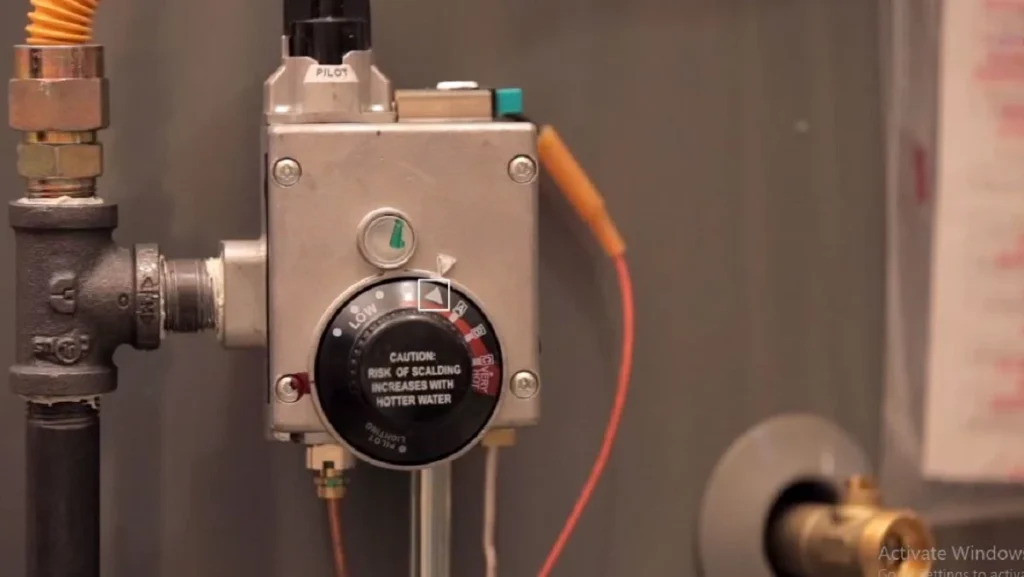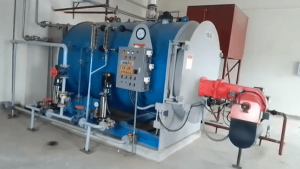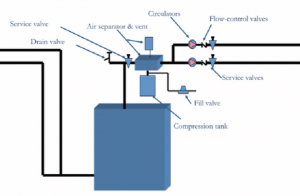Disclosure: As an Amazon Associate, I earn from qualifying purchases. Learn more
Last Updated on December 19, 2023 by Rhyes Frank
A gas water heater turning suddenly scalding hot is often due to an excessively high-temperature setting or a malfunctioning thermostat. Other causes can include high mineral content in the water or a blocked pressure relief valve, indicating a need for maintenance or repair.
When a gas water heater produces unexpectedly hot water, it signals a need for immediate attention to prevent potential hazards. The thermostat, a crucial component, might be faulty, leading to unregulated heating.
Regular monitoring of the temperature settings is vital, as even a slight adjustment can significantly affect the water temperature. In addition, mineral buildup inside the tank can insulate the water, causing overheating. This buildup often results from hard water, which leaves behind sediments that accumulate over time. Regularly flushing the tank can help mitigate this issue.
Another factor to consider is the pressure relief valve. This safety feature prevents excessive pressure build-up inside the tank. If blocked, it could lead to not only overheated water but also pose a significant safety risk. Periodic checks and maintenance of the pressure relief valve are essential for safe operation.
In cases where these issues persist, it may be a sign of a more severe problem, like a stuck heating element. In such scenarios, consulting a professional is advisable to ensure the safe and efficient functioning of the gas water heater.
5 Common Reasons for Gas Water Heaters Suddenly Scalding Hot, and Their Fixes
Gas water heaters are essential in many homes, providing hot water for various needs. However, when they start delivering scalding hot water unexpectedly, it’s a sign of underlying issues that need immediate attention.
1. Malfunctioning Thermostat
A primary reason for a gas water heater producing scalding hot water is a malfunctioning thermostat. The thermostat regulates the water temperature, and if it fails, it can cause the water to heat beyond the set temperature. This is not only dangerous but also increases energy consumption.
To fix this, first, try resetting the thermostat. If this doesn’t work, you might need to replace the thermostat. Ensure the new thermostat is compatible with your water heater model and installed correctly, following manufacturer guidelines.
2. High Mineral Content
Water with high mineral content, often termed hard water, can lead to sediment buildup in the tank. This buildup acts as an insulator, causing the heater to overwork and consequently overheat the water.
Regularly flushing the tank can prevent this buildup. This process involves draining the tank to remove the sediment. It’s advisable to do this at least once a year.
If the problem is severe, installing a water softener can be a long-term solution, reducing mineral content in the water before it enters the heater.
3. Incorrect Temperature Settings
Sometimes the issue is simply due to incorrect temperature settings. Users might inadvertently set the temperature too high. It’s recommended to keep the water heater temperature around 120°F to prevent scalding risks while providing comfortable hot water.
Adjusting the temperature is straightforward: locate the temperature dial on the water heater and turn it to the desired setting. It’s a good practice to periodically check this setting, especially after maintenance or repair work.
4. Blocked Pressure Relief Valve
The pressure relief valve is a safety feature in water heaters. If it becomes blocked, it can cause an increase in pressure and temperature within the tank. This scenario not only results in scalding water but also poses a significant safety risk.
To resolve this, check the valve and clear any obstructions. In some cases, replacing the valve is necessary.
5. Stuck Heating Element
In gas water heaters, a stuck heating element can lead to overheating of water. This typically happens when the element becomes continuously active, failing to switch off even when the desired temperature is reached.
Fixing this issue usually involves replacing the faulty element. It’s crucial to select the right element for your specific water heater model and to ensure it’s installed correctly.
Annual inspections by a professional can help identify and resolve such issues before they lead to scalding water.
Read Also: Using Water Heater in a Crawl Space: Pros and Cons
Excessive Heat on Lowest Setting: Gas Water Heater Issues
Encountering excessive heat from your gas water heater even on its lowest setting is a perplexing issue. This anomaly could stem from a malfunctioning thermostat. Thermostats are designed to regulate the water temperature within the heater, and a fault could lead to unregulated heating.
It’s crucial to check if the thermostat is accurately reflecting the temperature settings. If not, recalibrating or replacing it might be necessary.
Another possibility is a mechanical failure within the heater itself, where the gas valve or heating element malfunctions, causing continuous heating regardless of the set temperature. This situation calls for a thorough inspection by a professional.
In some cases, external factors like sudden changes in incoming water temperature can also affect the heater’s output. Ensuring proper insulation of the water pipes and checking for any external influences on the water supply can help in diagnosing and resolving the issue.

Preventing Overheating in Gas Water Heaters
Regular Maintenance Checks
Consistent maintenance is key to preventing overheating. This includes checking the thermostat, gas valve, and other components to ensure they are functioning correctly.
Adjusting Thermostat Settings
Regularly monitor and adjust the thermostat to maintain a safe water temperature. This simple step can prevent overheating and energy wastage.
Flushing the Tank
Sediment buildup can cause overheating. Periodic flushing of the tank removes these sediments, ensuring efficient heater operation.
Inspecting the Pressure Relief Valve
A functional pressure relief valve is crucial for safety. Regular inspections can prevent blockages that lead to overheating.
Common Questions About Sudden Overheating in Gas Water Heaters
What should I do if my water is too hot?
Immediately lower the thermostat setting and check if the temperature decreases. If the problem persists, consult a professional to inspect the thermostat and heating elements.
Can a gas leak cause my water heater to overheat?
A gas leak is unlikely to cause overheating. However, it’s a serious safety hazard that requires immediate attention. If you suspect a gas leak, turn off the gas supply and call a professional.
Is it safe to use the water heater if it’s overheating?
Using an overheating water heater can be dangerous. It’s best to turn it off and seek professional assistance to address the issue before further use.
Can hard water affect my gas water heater’s temperature?
Hard water can lead to sediment buildup, which can insulate the heating element and cause overheating. Regular flushing of the tank can help mitigate this issue.

